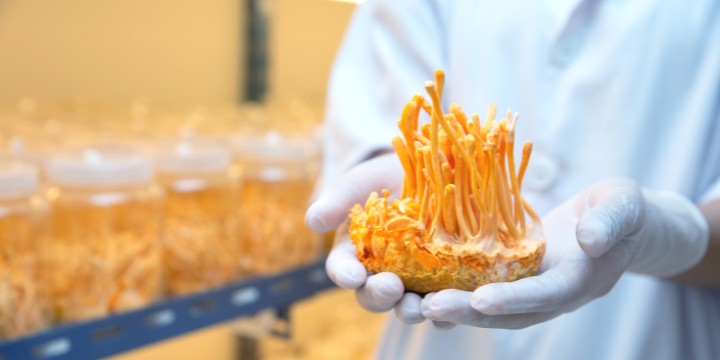Unless you’ve been living under a rock, you’ve likely heard about the buzz surrounding the popular video game and TV series "The Last of Us." For those of you wondering, “What is The Last of Us about?”, it is an exclusive HBO series that has captivated audiences with its post-apocalyptic world in which a deadly fungus, known as Cordyceps, has wiped out much of humanity.
Eversio's Desiree Caruso, ND talks about Cordyceps and Zombies in this VIDEO!
How Do You Get Infected in The Last of Us?
In “The Last of Us,” the Cordyceps fungus has mutated to a state in which it is able to infect the brains of humans, turning them into aggressive, zombie-like creatures whose main goal is to spread the infection as widely as possible. In the show, it only takes two days from initial exposure to the infection for Cordyceps to irreversibly take over the living bodies of its hosts. Eventually, the hosts become almost entirely fungus with minimal human-like features.
In the series, it is speculated that the outbreak began due to contamination of a crop or food staple, such as flour or sugar, that is commonly consumed worldwide. After that, any of those infected have the potential to easily infect others due to its highly contagious nature. It can be postulated that the basis of this fictional parasitic infection lies in Cordyceps’ ability to infect insects.
What Does Cordyceps Do to Insects?
The Cordyceps fungus is a specialized parasite of insects; they infect living hosts, grow inside them while they are alive, and reproduce once the host is dead. Cordyceps is an umbrella term that includes about 400 species, all of which are endoparasitoids, mainly on insects and other arthropods [1].
Much of the terrifying fame surrounding Cordyceps stems from the research completed on its ability to infect ants. Most notably, the species Ophiocordyceps unilateralis is a specialized parasite that infects, manipulates, then kills formicine ants [2]. Often, this species is referred to as “zombie-ant fungi” and they leave the ant with mushroom-like, reproductive fungal structures growing out of the carcass. This species is also said to control the behaviour of its host as it can make the ants it infects climb a plant and attach there before they die [1]. This ensures that there will be maximal distribution of its fungal spores as it has made the ant reach an environment of optimal temperature and humidity for reproduction [1].
Studies on the infection process have revealed that Cordyceps mushrooms infect living ants through airborne spores which then trigger behavioural changes in the host before killing it [3]. The ants are referred to as “zombies” because of the way in which their bodies are “governed by the fungus,” and while they look like ants, it is actually the fungal genome expressing fungal behaviour through the body of the ant [3].
The immunosuppressant, Cyclosporin, was first isolated from a species of Cordyceps fungus, Tolypocladium inflatum, in 1971 [4]. Cyclosporin is commonly used to help avoid organ transplant rejection, so the ability of the fungus to stay unnoticed inside its living host may have something to do with this type of molecule being expressed. Thus, it begs the question, “can humans be infected with Cordyceps?”
Can Cordyceps Evolve to Infect Humans?
While the Cordyceps fungi have tremendous chemical capabilities to manipulate the immune system of insects, it is unlikely for them to ever make the jump to a mammalian host, such as humans. Firstly, most Cordyceps species are so specialized on their host that a Cordyceps infecting ants in one part of the world is not able to infect ants in a different part. Second, insects are made of fairly different carbohydrates than mammals, and a successful fungal parasite would have to evolve new enzymes to succeed on a new host; there aren’t any known Cordyceps able to feed off mammalian lymph or live tissues. Moreover, mammalian bodies are much hotter than insect ones, and their immune system is fundamentally different. Most significant of all is the fact that Cordyceps fungi evolved more than 65 million years ago, as suspected by fossil specimens identified from amber, and in this period of time, they have not made the switch to a mammalian host. Although the idea of a fungal infection wiping out much of humanity is not without some basis in reality, Cordyceps fungi do not rank in the likely candidate.
Is Cordyceps Safe for Humans?
Countless studies and decades of research have established that Cordyceps militaris, the species carried by Eversio Wellness, is safe for consumption. Cordyceps is Mother Nature’s all-natural performance enhancer. This natural exercise mimetic is commonly used by athletes to boost energy, improve stamina, and increase endurance without caffeine or any addictive chemical stimulants. Clinical trials have shown that Cordyceps results in many of these benefits because it upregulates energy-producing pathways in the body and increases ATP, which is an energy-carrying molecule found in our cells [5]. Research also shows that ATP reduction, and its relation to oxidative stress, is linked to mental health as depleted levels have been seen in mood disorders [6]. Due to its antioxidant capabilities, Cordyceps has been found to improve cellular and mitochondrial antioxidant statuses, leading to enhancement of ATP generation capacity [7]. Keep in mind, this is just one of many potential health benefits that Cordyceps may provide.

While Cordyceps is a fascinating and unique fungus, it is not capable of infecting humans like it is portrayed in "The Last of Us." This aspect of the game and TV series is purely a work of fiction and should not be taken as a representation of the capabilities of Cordyceps in the real world. In fact, I’d encourage you to investigate the medicinal roles it has held in traditional Chinese medicine for centuries, including boosting energy and enhancing the immune system.
We hope you have found this article informative. If you have any questions or comments, please feel free to leave them in the comment section below!
By Silvana Jakupovic — BSc and 4th Year Student of Naturopathic Medicine (CCNM-Boucher)
References:
[1] http://clearlyexplained.com/cordyceps/index.html
[2] Evans HC, Elliot SL, Hughes DP. Ophiocordyceps unilateralis: A keystone species for unraveling ecosystem functioning and biodiversity of fungi in tropical forests? Commun Integr Biol. 2011 Sep;4(5):598-602. doi: 10.4161/cib.4.5.16721. Epub 2011 Sep 1. PMID: 22046474; PMCID: PMC3204140.
[3] Hughes, D.P., Andersen, S.B., Hywel-Jones, N.L. et al. Behavioral mechanisms and morphological symptoms of zombie ants dying from fungal infection. BMC Ecol 11, 13 (2011). https://doi.org/10.1186/1472-6785-11-13
[4] https://en.wikipedia.org/wiki/Ciclosporin
[5] Hirsch KR, Smith-Ryan AE, Roelofs EJ, Trexler ET, Mock MG. Cordyceps militaris Improves Tolerance to High-Intensity Exercise After Acute and Chronic Supplementation. J Diet Suppl. 2017 Jan 2;14(1):42-53. doi: 10.1080/19390211.2016.1203386. Epub 2016 Jul 13. PMID: 27408987; PMCID: PMC5236007.
[6] Allen J, Romay-Tallon R, Brymer KJ, Caruncho HJ, Kalynchuk LE. Mitochondria and Mood: Mitochondrial Dysfunction as a Key Player in the Manifestation of Depression. Front Neurosci. 2018 Jun 6;12:386. doi: 10.3389/fnins.2018.00386. PMID: 29928190; PMCID: PMC5997778.
[7] Ko KM, Leung HY. Enhancement of ATP generation capacity, antioxidant activity and immunomodulatory activities by Chinese Yang and Yin tonifying herbs. Chin Med. 2007 Mar 27;2:3. doi: 10.1186/1749-8546-2-3. PMID: 17386115; PMCID: PMC1847515.




















Leave a comment
All comments are moderated before being published.
This site is protected by hCaptcha and the hCaptcha Privacy Policy and Terms of Service apply.